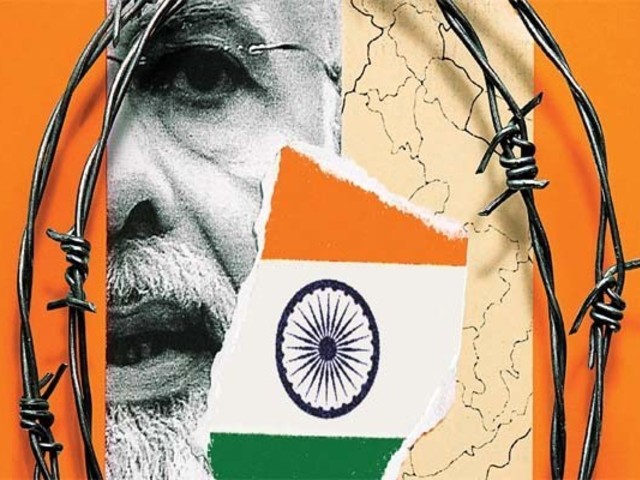
India, despite being the world’s largest democracy, has been marred by accusations of human rights violations and the suppression of minority liberties. In 2019, the Hindu nationalist government of the Bharatiya Janata Party (BJP) targeted the Sikh minority in East Punjab and Muslims in Kashmir in what seemed to be a calculated strategy to stifle dissent, resulting in humanitarian crises in these Muslim-majority areas. While the international community has largely focused on Kashmir, the deteriorating situation in Punjab has received far less attention. More recently, the Indian government’s focus has shifted to the Christian community in Manipur, marking yet another instance of minority persecution.
The conflicts in Palestine and Kashmir stand as two of the most entrenched and complex global challenges, both with deep ideological and territorial roots that have made resolution elusive for decades. Now, Manipur seems to be following the same pattern as Kashmir, where the Indian government has silenced the majority while favoring Hindu nationalists who form the minority in those regions. India, once founded as a secular state where all religions could coexist, has since witnessed a significant shift, especially under Prime Minister Narendra Modi’s leadership. Under his governance, India has transformed from a secular nation into one of the world’s largest violators of human rights, with the government accused of orchestrating the genocide of minorities following its actions in Kashmir.
The plight of Manipur mirrors the tragic story of Muslims in Kashmir. Since May 2023, over 200 people have been killed, hundreds injured, and more than 60,000 displaced, forced to live in overcrowded shelters. Kuki women have reported horrific acts of sexual violence, including rape, by Meitei mobs. Homes, businesses, villages, and places of worship—mainly belonging to the Kuki community—have been destroyed, attacked, and vandalized.
Manipur, located in northeastern India bordering Bangladesh and Myanmar, is home to around 3.3 million people. Over half the population consists of Meiteis who are Hindus by religion, with the remaining 43% comprising Kuki who are Christians and Naga tribes. While the Meiteis inhabit the Imphal Valley, the Kukis reside in the surrounding hills. To quell the violence, the Indian government has deployed 40,000 soldiers, paramilitary forces, and police to the region, yet the unrest continues unabated.
Protests have surged in Manipur, driven by the Kuki-Zo, a major tribal group from the hill regions, following violent clashes with the Meitei community. The violence was sparked by a controversial court ruling that permitted Meiteis to purchase land in areas previously off-limits to them. Although the Manipur High Court rescinded this ruling in February 2024, tensions between the communities had already been simmering. The Meiteis accuse the Kuki-Zo of illegal immigration, poppy cultivation for the drug trade, and benefiting disproportionately from government quotas in education and employment. Conversely, the Kuki-Zo claim they are being unfairly targeted, citing accelerated evictions from their forested lands as an attempt to undermine their territorial claims and rights.
This conflict draws strong parallels to the revocation of Article 370 in 2019, which stripped Jammu and Kashmir of its special status, leading to mass detentions, communication blackouts, and severe economic disruptions. Similarly, the recent decision to grant tribal status to the Meitei has further marginalized the Kuki-Zo community, threatening their historical claims and resources.
The violence has escalated significantly, with six people killed on September 7, 2024, during clashes in Jiribam district, and more fatalities reported in nearby areas. A Geneva based Internal Displacement Monitoring Centre in a report released in May,2024- has reported that of the 69,000 displaced people in South Asia in 2023, 67,000—an overwhelming 97%—were from India, with the majority coming from Manipur.
The rising tide of violence against minorities in recent years has raised serious concerns about what many see as a systematic effort to discriminate against and marginalize these groups. Some observers have even drawn chilling comparisons between the growing “otherness” of Indian minorities and the early stages of the Holocaust, highlighting similarities with the rise of Nazism in Germany. The ideology of Hindutva, rooted in V.D. Savarkar’s treatises ‘Essentials of Hindutva’ and ‘Hindutva: Who is a Hindu?’, lies at the heart of this problem. Critics argue that this ideology mirrors the racist principles of the Nazi regime, particularly in its persecution of Jews and non-Aryan races. The Rashtriya Swayamsevak Sangh (RSS), founded in 1925 as a paramilitary group, remains the driving force behind Hindutva, with its political wing, the BJP, bearing structural similarities to the Nazi Party.
In a July 2024 report, Amnesty International stated, “More than four hundred days since the start of ethnic violence between the dominant Meitei community and the minority Kuki and other tribal hill communities, the Bharatiya Janata Party (BJP)-led Indian government and Manipur state government have utterly failed to end the violence and displacement, and protect human rights in the state.” The report emphasized the scale of the devastation since May 2023, including over 200 deaths, 60,000 displacements, and widespread destruction of homes, businesses, and places of worship. Despite this, authorities continue to crack down on those who speak out against the violence.
The continuing violence in Manipur, along with persistent human rights abuses in Kashmir and elsewhere, highlights an alarming rise in the persecution of minority communities under the BJP government. The parallels between Manipur and Kashmir reveal a disturbing pattern of state-sponsored violence and systemic discrimination. As organizations like Amnesty International criticize the government’s inability to protect its citizens, the erosion of India’s secular identity raises serious questions about its commitment to democracy and human rights. This deepening crisis reflects a broader shift toward Hindutva-driven nationalism, which increasingly alienates India’s religious and ethnic minorities, fueling unrest and widespread displacement.
